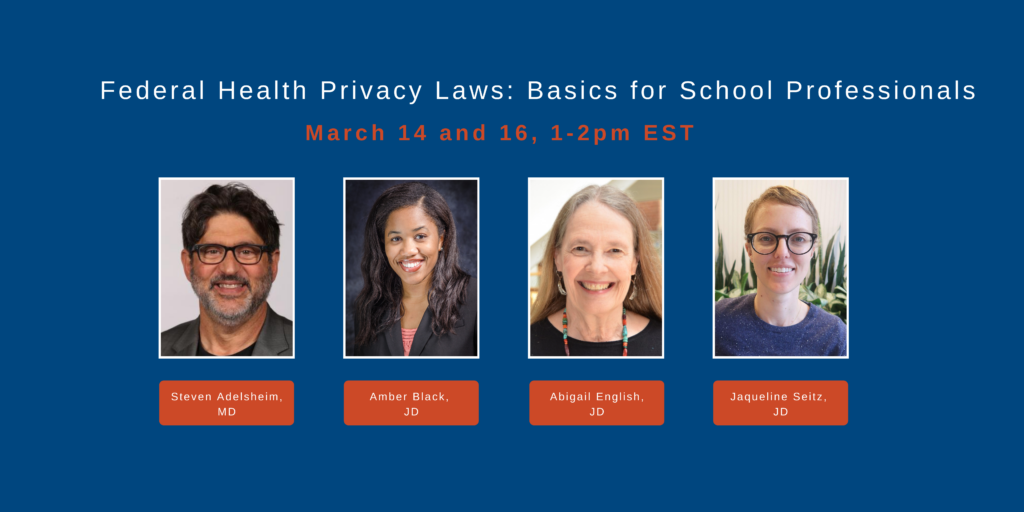Speaker Lineup for Early Psychosis 101: Basics for Supporting Students, a 3-Part Introductory Series

Session 1 Speakers
October 18: Recognizing and Responding to Signs of Risk for Psychosis in Students
Michelle Friedman-Yakoobian, Ph.D., is a licensed clinical psychologist in Boston, MA. She is the co-director of the Early Psychosis Working Group of the MHTTC Network and trainer for the New England MHTTC. Dr. Friedman-Yakoobian’s career has been devoted to the development and implementation of effective psychosocial interventions for individuals experiencing psychosis (or signs of risk) and their families. She co-founded the CEDAR Clinic, the first clinic for youth at clinical high risk for psychosis in MA and is also the Associate Director of a Clinical High Risk for Psychosis (CHR-P) Community Programs grant focused on expanding early intervention for psychosis across MA. She is a principal investigator in the Response to Risk Program at Beth Israel Deaconess Medical Center with a research program focused on developing school & cognitive interventions for youth at CHR-P. Dr. Friedman-Yakoobian is also an Assistant Professor in Psychiatry at Harvard Medical School. She earned her undergraduate degree in human development and family studies at Cornell University and her doctorate in clinical psychology at the University of Massachusetts Boston.
Vera A. Muñiz-Saurré (they/éle) is a nonbinary, queer, Peruvian public health professional currently working as a Program Coordinator and Peer Advocate for the Massachusetts Psychosis Prevention Partnership (M3P) and Building Bridges towards Equity in Psychosis Intervention and Careers (2B-EPIC) grants at Beth Israel Deaconess Medical Center and a Peer Counselor at the Lab for Early Psychosis at McLean Hospital. Vera is diagnosed with Schizoaffective disorder, a survivor of conversion therapy targeting their sexuality, and identifies as Mad and a psychiatric survivor. Starting in 2017, Vera helped found and admin the Psychosis Spectrum Server on Discord and still helps maintain that community! Vera graduated with their Bachelor of Arts in Psychology and their Master of Public Health in Community Health Sciences from Boston University.
Session 2 Speakers
November 1: Hope, Healing and Homework: Empowering Educators in Screening for Psychosis and Navigating School Supports for Students with Psychosis
Apurva Bhatt, M.D., is a Clinical Assistant Professor in the Department of Psychiatry and Behavioral Sciences at Stanford University School of Medicine. She completed her undergraduate and medical school education at the University of Missouri-Kansas City's 6-year combined BA/MD program. She went on to complete her residency training at the University of Missouri-Kansas City/Center for Behavioral Medicine’s Adult Psychiatry residency program and graduated Child and Adolescent Psychiatry fellowship at the University of California Davis. She is co-chair of the Early Psychosis Work group at the American Academy of Child and Adolescent Psychiatry.
Dr. Schiffman earned a Ph.D. in Clinical Psychology from the University of Southern California. He is Professor and Director of Clinical Training within the Department of Psychological Science, University of California, Irvine. Dr. Schiffman previously founded and developed two clinical, research, and training programs serving people at clinical high risk for psychosis. He has published nearly 200 scientific articles and procured $14M in grants. Dr. Schiffman is one of only three certified trainers of the SIPS in the US. His psychosis research refines the identification process of people at risk, elucidates the effects of psychosocial interventions, and uncovers mechanisms reducing stigma.
Session 3 Speakers
November 15: Transition to College for Youth with Psychosis
Apurva Bhatt, M.D., is a Clinical Assistant Professor in the Department of Psychiatry and Behavioral Sciences at Stanford University School of Medicine. She completed her undergraduate and medical school education at the University of Missouri-Kansas City's 6-year combined BA/MD program. She went on to complete her residency training at the University of Missouri-Kansas City/Center for Behavioral Medicine’s Adult Psychiatry residency program and graduated Child and Adolescent Psychiatry fellowship at the University of California Davis. She is co-chair of the Early Psychosis Work group at the American Academy of Child and Adolescent Psychiatry.
Bethany Boik is a graduate from the University of Michigan- Dearborn; where she received her bachelor's degree in Behavioral Sciences. While attending college, Bethany served two service year terms in Americorps. Eventually leading her to pursue work in child abuse prevention. Later working in the community mental health field with at-risk youth and young adults in Detroit, Michigan. In 2018, Bethany received an award through the Detroit Wayne Mental Health Authority, a Youth United Change Maker award, for supporting youth voices. In 2022, she won a mini grant to assist in publishing her first book, entitled Diary of a Schizophrenic. The book is a memoir about growing up with multiple mental illnesses, including schizoaffective disorder: a form of schizophrenia and bipolar disorder.
Zhanna Elberg is an assistant professor of clinical psychiatry at the University at Buffalo Jacob's School of Medicine where she also serves as the associate training director of the general psychiatry residency program. She is the program director of OnTrack NY @ECMC, a coordinated specialty care program for young adults recovering from first episode psychosis.
Olivia Hamrah, MD, (she/her), is a child and adolescent psychiatrist at MedStar Georgetown University Hospital. She works with adolescents and emerging adults in the outpatient transition age clinic and in school-based mental health. Her clinical and research focus is in early and first episode psychosis including the prevention of psychosis, treatment of clinical high-risk for psychosis, CBT and MCT for psychosis, and pharmacotherapy. Dr. Hamrah completed her fellowship training at MedStar Georgetown University Hospital and her adult psychiatry training at UPMC Western Psychiatric Hospital in Pittsburgh, Pennsylvania. Prior to her medical training, Dr. Hamrah taught middle school physics and math at a public charter school in Washington, DC.



